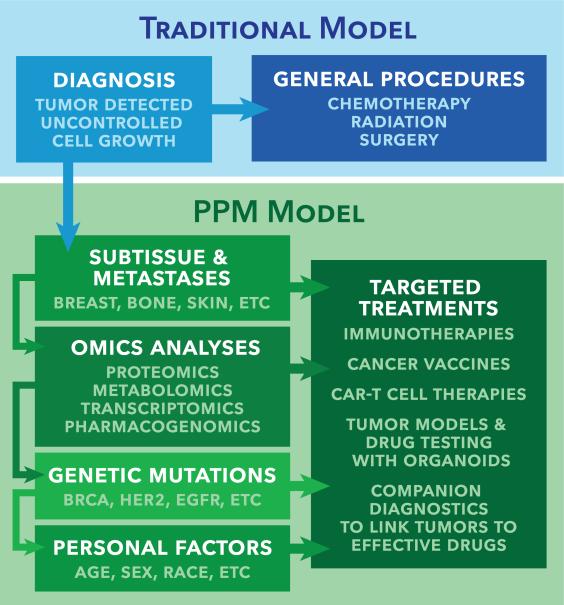
Credit: Authors
In a paper published in the September/December 2018 issue of TECHNOLOGY, a group of researchers from Rutgers University Department of Biomedicine Engineering have published a review paper on the transformative potential of precision and personalized medicine (PPM) for cancer treatment.
A group of Rutgers PhD fellows and faculty published a review paper on the transformative potential of precision and personalized medicine (PPM) for cancer treatment. Their analysis considers the entire process from acquiring PPM data, to developing a PPM product, and addresses broader economic and societal consequences. This review paper is the culminating achievement of a cohort of twelve Ph.D. student fellows at Rutgers University that were funded under the US Department of Education Graduate Training in Emerging Areas of Precision and Personalized Medicine Grant (Award Number P200A150131). Professor Martin Yarmush served as the Program Director and Principal Investigator of the award.
A primary message of the paper is that PPM has the potential to transform cancer care
(see image). The traditional model is limited to tumor detection, followed by general treatment
procedures such as surgery, chemotherapy, and radiation. In contrast, the PPM approach allows for targeted treatments, which are more effective and avoid unnecessary side effects. These treatments are identified by analyzing specific tissues, gene mutations, and personal factors relevant to each unique case of cancer. Examples of such emerging treatments include immunotherapies, cancer
vaccines, companion diagnostics, and more.
In addition, the authors addressed societal issues of PPM in healthcare. Although potentially
transformative, a lot of difficult questions must be answered before PPM becomes part of standard cancer care. These include regulatory challenges, economic concerns and feasibility, and associated socioeconomic and privacy issues. Today, PPM technology exists and is rapidly becoming more
efficient and sophisticated; however, these questions must be tackled in order to allow for the smooth integration of PPM into cancer care.
###
Authors include Paulina Krzyszczyk, Alison Acevedo, Erika J. Davidoff, Lauren M. Timmins, Ile-ana Marrero-Berrios, Misaal Patel, Corina White, Christopher Lowe, Joseph J. Sherba, Clara Hartmanshenn, Kate M. O’Neill, Max L. Balter, Zachary R. Fritz, Ioannis P. Androulakis, Rene S. Schloss & Martin L. Yarmush. All authors are from the Department of Biomedical Engineering and/or the Department of Chemical & Biochemical Engineering at Rutgers.
This work was funded by the Graduate Training in Emerging Areas of Precision and Personalized Medicine Grant (award number P200A150131) from the U.S. Department of Education. We would also like to acknowledge funding from The National Institute of General Medical Sciences (NIH T32 GM008339).
Corresponding author for this review in TECHNOLOGY is Professor Martin Yarmush.
For more insight into the research described, readers are invited to access the paper on TECHNOLOGY.
IMAGE
Caption: Traditional versus PPM model for cancer treatment. A comparison of the key differences in the traditional model of cancer treatment and the emerging PPM model. Traditionally, cancer has been treated using general, ‘one size fits all’ approaches such as chemotherapy, radiation, and surgical excision of tumors. These treatments vary widely in efficacy across individuals and also often cause harm to healthy, non-cancerous organs and tissues. The PPM approach is characterized by individualized treatments tailored to specific tissues, gene mutations, and personal factors relevant to each unique case of cancer. Companion diagnostics help identify which treatments will be most effective for a specific patient’s tumor, and novel cell therapies are used to target the cancer with minimal damage to healthy tissues, making the PPM model more effective and safer.
Fashioned as a high-impact, high-visibility, top-echelon publication, this new ground-breaking journal – TECHNOLOGY – will feature the development of cutting-edge new technologies in a broad array of emerging fields of science and engineering. The content will have an applied science and technological slant with a focus on both innovation and application to daily lives. It will cover diverse disciplines such as health and life science, energy and environment, advanced materials, technology-based manufacturing, information science and technology, and marine and transportations technologies.
About World Scientific Publishing Co.
World Scientific Publishing is a leading independent publisher of books and journals for the scholarly, research, professional and educational communities. The company publishes about 600 books annually and about 135 journals in various fields. World Scientific collaborates with prestigious organizations like the Nobel Foundation and US National Academies Press to bring high quality academic and professional content to researchers and academics worldwide. To find out more about World Scientific, please visit http://www.
For more information, contact Tay Yu Shan at [email protected].
Media Contact
Tay Yu Shan
[email protected]
Original Source
https:/
Related Journal Article
http://dx.




